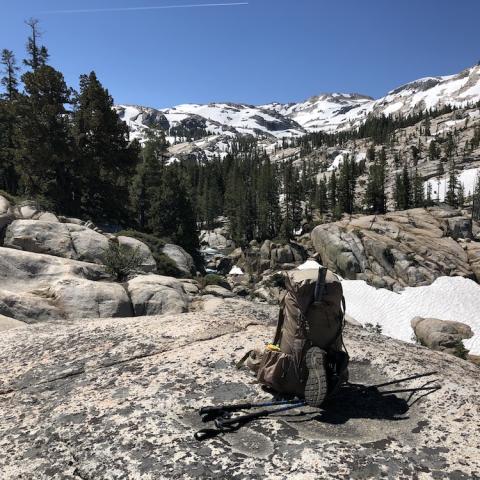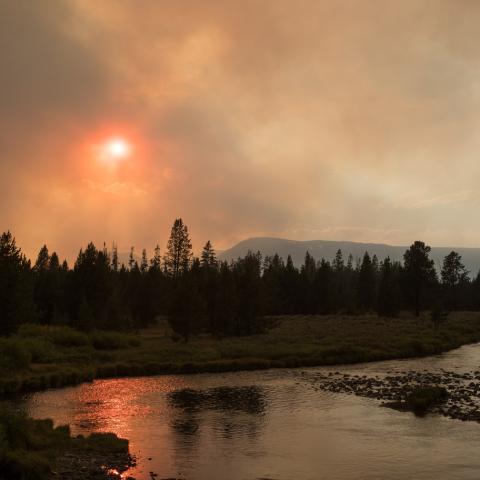
U.S. Rep. Liz Cheney has introduced legislation to permanently remove the gray wolf in Wyoming and the Great Lakes region from Endangered Species Act protections/NPS
Freshman U.S. Rep. Liz Cheney has introduced legislation to permanently remove the gray wolf from the Endangered Species List in both Wyoming and the Great Lakes region, saying the states can do a better job of managing the predator than the federal government.
One of the measure's provisions would prevent the delisting from being subject to judicial review and lawsuits.
"Wyoming should be able to manage the gray wolf without outside interference. This bill will stop the 'management by litigation' culture that has done so much damage to our state. This bill instructs the (U.S.) Fish and Wildlife Service to once again delist and prohibits judicial review of that determination. Wyoming will once again be able to manage the gray wolf population in a way that serves the best interests of the citizens of our state," said Rep. Cheney, a Wyoming Republican and daughter of former vice president, Defense secretary and U.S. Rep. Dick Cheney.
The legislation was immediately condemned by Defenders of Wildlife, which said the congresswoman prefers to manage "wildlife recovery ... by legislative fiat."
“There they go again. Some members of Congress choose to ignore science and the law and instead want to manage wildlife recovery in the U.S. by legislative fiat," said Defenders CEO and President Jamie Rappaport Clark. "We’ve been down this road before. In 2012, Defenders and several other conservation groups challenged the Fish and Wildlife Service’s decision to delist gray wolves in Wyoming under the Endangered Species Act and we won. Wyoming’s wolf management plan was not protective enough to recover gray wolves and would have allowed for wolves to be killed on sight across 85 percent of the state. This is not a responsible approach to management of an imperiled species."
Last May, members of the House, in a draft bill to fund the Interior Department, inserted language to strip Endangered Species Act protections from wolves in Grand Teton and Yellowstone national parks. That language eventually was dropped.
But Rep. Cheney, whose measure was cosponsored by Reps. Collin C. Peterson of Minnesota and Sean Duffy of Wisconsin, said states should have the final say in managing wildlife within their borders.
The problem with the legislation, according to Defenders, is it circumvents science in its management approach.
“An attempt to delist wolves through congressional legislation is not a scientific or thoughtful approach. It could open the floodgates to endless proposals to delist endangered species based on politics, not on science, undermining the integrity of the Endangered Species Act and our ability to protect and recover our nation’s imperiled wildlife," said Ms. Rappaport.
In 2011, Congress moved to delist wolves in Idaho, Montana, a small section of northern Utah, and the eastern portion of Washington and Oregon. In October 2012, Defenders and several other conservation groups challenged the Fish and Wildlife Service’s decision to delist gray wolves in Wyoming under the Endangered Species Act. Defenders’ principal concern was with Wyoming’s wolf management plan, which classifies wolves as predators that can be killed at any time, for any reason in about 85 percent of the state.
Federal protections for gray wolves in Wyoming were reinstated on September 23, 2014, after a judge invalidated the U.S. Fish and Wildlife Service’s 2012 statewide Endangered Species Act delisting of the species. In December 2014, a second federal judge overturned the FWS’s December 2011 decision to delist the gray wolf in the Western Great Lakes region, including Wisconsin, Minnesota, and Michigan. In both instances, the courts ruled that the FWS had failed to comply with various provisions of current law.
There were once up to 2 million gray wolves living in North America, but the animals were driven to near-extinction in the lower 48 states by the early 1900s. After passage of the federal Endangered Species Act in 1973 and protection of the wolf as endangered, federal recovery programs resulted in the rebound of wolf populations in limited parts of the country. Biologists believe that more than 5,500 wolves currently live in the continental United States – a fraction of the species’ historic numbers.




 Support Essential Coverage of Essential Places
Support Essential Coverage of Essential Places







Comments
Heaven help us. Another Cheney has been let out of the asylum.
And she is very very very close to her father; one of the most malignant men to ever rise to power in this country.
This is so disheartening. I'm disgusted Minnesota Congressmen Nolan and Peterson are supporting this folly.
Well we have the best wildlife biologists in the world working for our own US Fish and Wildlife Service and they are the entity we the people have decided to entrust with all endangered species listings, maybe we could have let them make these kinds of decisions. Instead orgs driven by donations and fear mongering like Ms. Clarks have caused such an impasse of litigation that we need to take the legislative option, the democratic option, of passing bills enshrining our US Fish and Wildlife's decisions as beiing above litigation. (and beyond the reach of donation driven orgs such as Ms. Clark's)
Of course Ms. Clark's history with the wolf is a complicated one. Using misappropriated funds that later led to a full congressional investigation resulting in new oversight and rules for the distribution of funds by the government agency Ms. Clark ran, Ms Clark is directly responsible for bringing wolves from Canada to the United STates in the first place. And under an agreement made mby Ms Clark at that time full management of wolves was supposed to be turned over to the states a full fifteen years ago when wolf populations reached agreed upon numbers. Jamie Rappaport Clark would be one of the last people I'd use as a reference on anything wolf, at least until she returns that money.
Thank goodness we have people like Ms Clark to stand up and do whatever is necessary to try to overcome politically driven wildlife management decisions.
She, and others like her, will be especially important in the coming four years.
Ugh..We need to eradicate the Cheney Clan before they infest the whole planet.
Save our wildlife.
Soo tired of the war on wolves! TO make this statement about permanently removing them just shows you how ignorant and hateful they are of nature and the importance of predators and the balance of nature and science-I am sure she also sides with Trump that climate change is a hoax-perhaps the world is FLAT too!!!!
It's TIME to FIGHT for our wildlife before there is NO habitat and NO animals left!